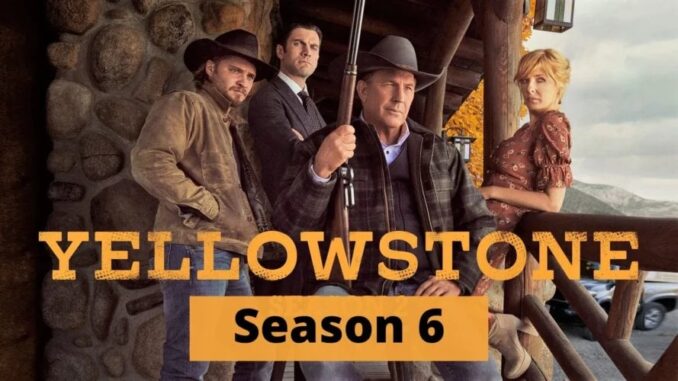
The Last Ride into the Sunset: Yellowstone Season 6 (2025) and the End of a Modern Western Legend
The wind whips through the tall grass of the Montana high country, carrying with it the scent of pine, horse sweat, and the ghosts of battles fought. For five seasons, soon to be six in our imagined 2025, Yellowstone has not merely been a television show; it has been a seismic cultural event, a modern Iliad set against the stunning, unforgiving backdrop of the American West. The announcement of its impending final chapter, a hypothetical Season 6 in 2025 as the ultimate curtain call, signals not just the conclusion of a narrative, but the definitive sunset on a sprawling, brutal, and utterly captivating legend that has redefined the Western for a new generation.
From its very first sweeping shot, Yellowstone has been an ode and an elegy to a disappearing America. It’s a series illustrative of the land itself – vast, beautiful, and scarred. The Dutton Ranch, a sprawling empire measured in generations and bloodshed, is not just property; it is a character, a symbol, a contested battleground. We have seen it from every angle: through the telescopic lens of corporate greed, the hallowed perspective of ancestral indigenous claims, and the visceral, often ruthless, gaze of the Dutton family. Season 6, in this envisioned final act, will undoubtedly plunge us deeper into the heart of this conflict, the land breathing its last breaths of untouched wilderness as urban sprawl and political machination close in like vultures. The imagery will be stark: helicopters buzzing over pristine valleys, lawyers circling in glass towers, juxtaposed against the enduring, almost anachronistic, sight of Rip Wheeler on horseback, a silhouette against a setting sun, embodying a defiance that feels increasingly out of time.
At the heart of this legend are the Duttons themselves – a family both fiercely loyal and profoundly broken, a modern-day pantheon of flawed gods clinging to their empire. John Dutton, a man carved from the very land he defends, his face a roadmap of weathered resolve and unspoken grief, stands as the unwavering, often ruthless, patriarch. Beth, a force of nature cloaked in designer clothes and armed with razor-sharp wit, is the vengeful goddess, her love a weapon, her pain an open wound. Rip, the silent, loyal protector, is the spirit of the old West incarnate, a primal roar against the encroaching tide. Kayce, the tormented son, forever caught between the pull of his family’s legacy and the siren call of a simpler, less bloody life, embodies the modern man’s struggle with tradition. In Season 6, their individual sagas will culminate, their fates intertwined in a final, agonizing dance. We imagine the quiet, heavy weight of John making his ultimate sacrifice, not just for the ranch, but for the very idea of it; Beth unleashing her final, cataclysmic act of retribution, leaving a path of scorched earth; and Kayce, perhaps, finally finding a fragile peace, or descending fully into the darkness of his birthright. These characters aren’t merely fictional constructs; they are illustrative archetypes, embodying the American dream, or nightmare, of power, legacy, and the corrosive nature of absolute loyalty.
The “modern Western legend” aspect of Yellowstone is its unflinching honesty about the contemporary frontier. This isn’t the romanticized West of black hats and white hats; it’s a world where morality is a shifting landscape, where heroes commit atrocities, and villains often have understandable motivations. The Native American narrative, spearheaded by Thomas Rainwater, provides an essential counterpoint, illustrating the historical injustices that inform the present conflicts, a multi-layered tapestry of grievances and land claims. In Season 6 (2025), the stakes will be existential. The final battle will likely not be a clean shootout, but a complex, agonizing chess match played across boardrooms, courtrooms, and desolate stretches of highway, punctuated by bursts of brutal, visceral violence. The illustrative imagery will shift from grand vistas to claustrophobic interiors, from the roar of a stampede to the deafening silence of a broken promise. It will be the reckoning, the inevitable collision of the unstoppable force of progress with the immovable object of tradition, and the devastating fallout in its wake.
As the credits roll on that final, hypothetical episode in 2025, a profound silence will descend. The echoes of gunshots, the thunder of hooves, and the impassioned screams of the Duttons will fade, leaving a void. Yellowstone will have left its indelible mark, a legend etched into the American cultural consciousness. It has forced us to confront uncomfortable truths about greed, family, identity, and the relentless march of time. Its illustrative power lies in its ability to marry the epic scale of Western myth with the gritty realism of contemporary drama.
The end of Yellowstone Season 6 will not simply be the end of a television series; it will be the quiet settling of dust after a monumental storm. The modern Western legend, fierce and unyielding, will have concluded its last ride into the sunset, leaving behind a legacy as vast and complex as the Montana landscape it so vividly brought to life. And like all great legends, its stories, its characters, and its enduring questions will continue to whisper on the wind, long after the screen goes dark.
